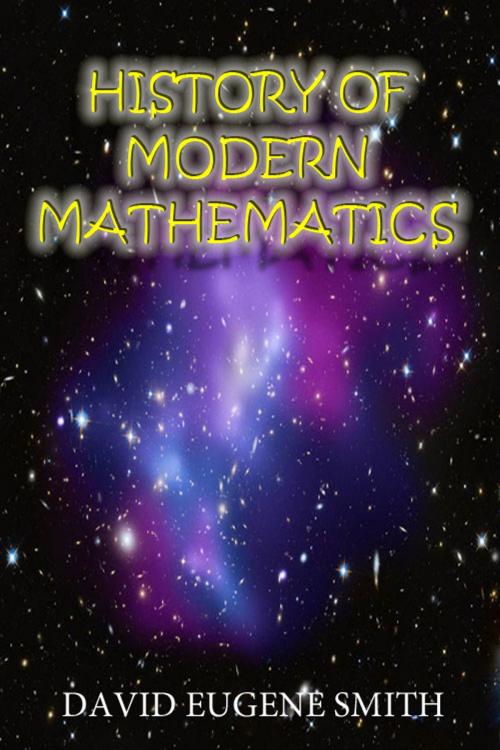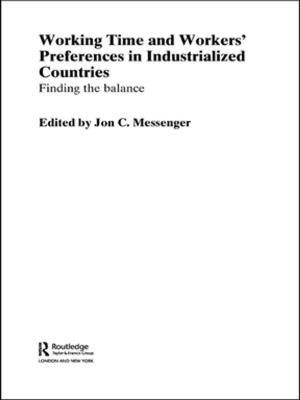History of Modern Mathematics
Nonfiction, Science & Nature, Mathematics, Differential Equations, Calculus, History| Author: | David E Smith | ISBN: | 1230000118249 |
| Publisher: | David E Smith | Publication: | March 30, 2013 |
| Imprint: | Language: | English |
| Author: | David E Smith |
| ISBN: | 1230000118249 |
| Publisher: | David E Smith |
| Publication: | March 30, 2013 |
| Imprint: | |
| Language: | English |
In considering the history of modern mathematics two questions at once arise:
(1) What limitations shall be placed upon the term Mathematics?
(2) What force shall be assigned to the word Modern? In other words, how shall Modern Mathematics be defined?
In these pages the term Mathematics will be limited to the domain of pure science. Questions of the applications of the various branches will be considered only incidentally. Such great contributions as those of Newton in the realm of mathematical physics, of Laplace in celestial mechanics, of Lagrange and Cauchy in the wave theory, and of Poisson, Fourier, and Bessel in the theory of heat, belong rather to the field of applications.
In particular, in the domain of numbers reference will be made to certain of
the contributions to the general theory, to the men who have placed the study of irrational and transcendent numbers upon a scientific foundation, and to those who have developed the modern theory of complex numbers and its elaboration in the field of quaternions and Ausdehnungslehre. In the theory of equations the names of some of the leading investigators will be mentioned, together with a brief statement of the results which they secured. The impossibility of solving the quintic will lead to a consideration of the names of the founders of the group theory and of the doctrine of determinants. This phase of higher algebra will be followed by the theory of forms, or quantics. The later development of the calculus, leading to differential equations and the theory of functions, will complete the algebraic side, save for a brief reference to the theory of probabilities.
In the domain of geometry some of the contributors to the later development of the analytic and synthetic fields will be mentioned, together with the most noteworthy results of their labors. Had the author’s space not been so strictly limited he would have given lists of those who have worked in other important lines, but the topics considered have been thought to have the best right to prominent place under any reasonable definition of Mathematics.
Modern Mathematics is a term by no means well defined. Algebra cannot be called modern, and yet the theory of equations has received some of its most important additions during the nineteenth century, while the theory of forms is a recent creation. Similarly with elementary geometry; the labors of Lobachevsky and Bolyai during the second quarter of the century threw a new light upon the whole subject, and more recently the study of the triangle has added another chapter to the theory. Thus the history of modern mathematics must also be the modern history of ancient branches, while subjects which seem the product of late generations have root in other centuries than the present.
To the influence of the schools and the journals must be added that of the various learned societies3 whose published proceedings are widely known, together with the increasing liberality of such societies in the preparation of complete works of a monumental character.
CONTENTS:
1 - THEORY OF NUMBERS
2 - IRRATIONAL AND TRANSCENDENT NUMBERS
3 - COMPLEX NUMBERS
4 - QUATERNIONS AND AUSDEHNUNGSLEHRE
5 - THEORY OF EQUATIONS
6 - SUBSTITUTIONS AND GROUPS
7 - DETERMINANTS
8 - QUANTICS
9 - CALCULUS
10 - DIFFERENTIAL EQUATIONS
11 - INFINITE SERIES.
12 - THEORY OF FUNCTIONS
13 - PROBABILITIES AND LEAST SQUARES
14 - ANALYTIC GEOMETRY
15 - MODERN GEOMETRY
16 - ELEMENTARY GEOMETRY
17 - NON-EUCLIDEAN GEOMETRY
In considering the history of modern mathematics two questions at once arise:
(1) What limitations shall be placed upon the term Mathematics?
(2) What force shall be assigned to the word Modern? In other words, how shall Modern Mathematics be defined?
In these pages the term Mathematics will be limited to the domain of pure science. Questions of the applications of the various branches will be considered only incidentally. Such great contributions as those of Newton in the realm of mathematical physics, of Laplace in celestial mechanics, of Lagrange and Cauchy in the wave theory, and of Poisson, Fourier, and Bessel in the theory of heat, belong rather to the field of applications.
In particular, in the domain of numbers reference will be made to certain of
the contributions to the general theory, to the men who have placed the study of irrational and transcendent numbers upon a scientific foundation, and to those who have developed the modern theory of complex numbers and its elaboration in the field of quaternions and Ausdehnungslehre. In the theory of equations the names of some of the leading investigators will be mentioned, together with a brief statement of the results which they secured. The impossibility of solving the quintic will lead to a consideration of the names of the founders of the group theory and of the doctrine of determinants. This phase of higher algebra will be followed by the theory of forms, or quantics. The later development of the calculus, leading to differential equations and the theory of functions, will complete the algebraic side, save for a brief reference to the theory of probabilities.
In the domain of geometry some of the contributors to the later development of the analytic and synthetic fields will be mentioned, together with the most noteworthy results of their labors. Had the author’s space not been so strictly limited he would have given lists of those who have worked in other important lines, but the topics considered have been thought to have the best right to prominent place under any reasonable definition of Mathematics.
Modern Mathematics is a term by no means well defined. Algebra cannot be called modern, and yet the theory of equations has received some of its most important additions during the nineteenth century, while the theory of forms is a recent creation. Similarly with elementary geometry; the labors of Lobachevsky and Bolyai during the second quarter of the century threw a new light upon the whole subject, and more recently the study of the triangle has added another chapter to the theory. Thus the history of modern mathematics must also be the modern history of ancient branches, while subjects which seem the product of late generations have root in other centuries than the present.
To the influence of the schools and the journals must be added that of the various learned societies3 whose published proceedings are widely known, together with the increasing liberality of such societies in the preparation of complete works of a monumental character.
CONTENTS:
1 - THEORY OF NUMBERS
2 - IRRATIONAL AND TRANSCENDENT NUMBERS
3 - COMPLEX NUMBERS
4 - QUATERNIONS AND AUSDEHNUNGSLEHRE
5 - THEORY OF EQUATIONS
6 - SUBSTITUTIONS AND GROUPS
7 - DETERMINANTS
8 - QUANTICS
9 - CALCULUS
10 - DIFFERENTIAL EQUATIONS
11 - INFINITE SERIES.
12 - THEORY OF FUNCTIONS
13 - PROBABILITIES AND LEAST SQUARES
14 - ANALYTIC GEOMETRY
15 - MODERN GEOMETRY
16 - ELEMENTARY GEOMETRY
17 - NON-EUCLIDEAN GEOMETRY















